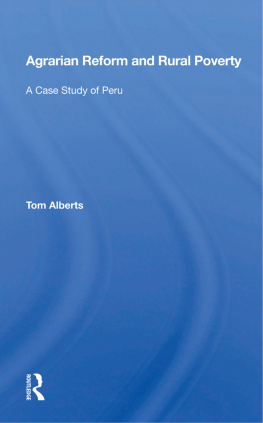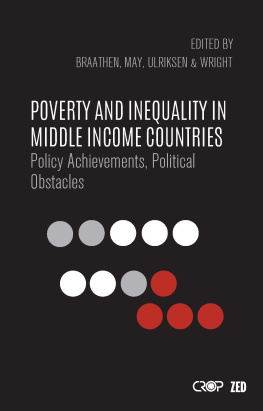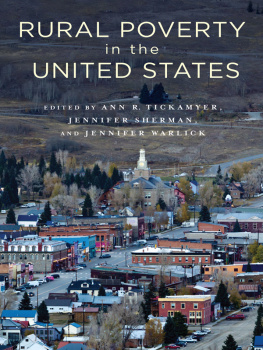Persistent Poverty in Rural America
Rural Studies Series of the Rural Sociological Society
Series Editor
Forrest A. Deseran, Louisiana State University
Editorial Board
Lionel J. Beaulieu, University of Florida
Richard S. Krannich, Utah State University
Dudley L. Poston, Texas A&M University
C. Matthew Snipp, University of WisconsinMadison
Deborah M. Tootle, USDA ERS ARED
DeeAnn Wenk, University of Oklahoma
Rural Studies Series
Persistent Poverty in Rural America, Rural Sociological Society Task Force on Peristent Rural Poverty
The Future of Rural America: Anticipating Policies for Constructive Change, edited by Kenneth E. Pigg
Rural Policies for the 1990s, edited by Cornelia B. Flora and James A. Christenson
The Rural South in Crisis: Challenges for the Future, edited by Lionel J. Beaulieu
Research, Realpolitik, and Development in Korea: The State and the Green Revolution, Larry L. Burmeister
Whose Trees? Proprietary Dimensions of Forestry, edited by Louise Fortmann and John W. Bruce
Small Farms: Persistence with Legitimation, Alessandro Bonanno
Family Farming in Europe and America, edited by Boguslaw Galeski and Eugene Wilkening
Persistent Poverty in Rural America
Rural Sociological Society Task Force on Persistent Rural Poverty
Foreword by
Emery N. Castle
Rural Sociological Society Business Office
Department of Sociology
Montana State University
Bozenian MT 59717
The project that is the subject of this report was approved by the Council of the Rural Sociological Society at its annual meeting in August 1990.
This report has been reviewed by three groups other than the authors: (1) the Task Force Advisory Committee, (2) a panel of subject matter specialists, and (3) The Rural Sociological Society's Rural Studies Series Editorial Committee.
This project was supported by the W. K. Kellogg Foundation of Battle Creek, Michigan, and the directors of the Regional Centers for Rural Development.
First published 1993 by Westview Press, Inc.
Published 2019 by Routledge
52 Vanderbilt Avenue, New York, NY 10017
2 Park Square, Milton Park, Abingdon, Oxon OX14 4RN
Routledge is an imprint of the Taylor & Francis Group, an informa business
Copyright 1993 Taylor & Francis
All rights reserved. No part of this book may be reprinted or reproduced or utilised in any form or by any electronic, mechanical, or other means, now known or hereafter invented, including photocopying and recording, or in any information storage or retrieval system, without permission in writing from the publishers.
Notice:
Product or corporate names may be trademarks or registered trademarks, and are used only for identification and explanation without intent to infringe.
A CIP catalog record for this book is available from the Library of Congress.
ISBN 13: 978-0-367-28264-6 (hbk)
Contents
, Emery N. Castle
To appreciate this volume, one needs to know how the Task Force on Persistent Rural Poverty came into being and how it was that Gene Summers became its director. This Foreword will provide some of this background and offer an opinion on the significance of the scholarship reported herein.
Gene Summers is a member and vice chairman of the National Rural Studies Committee. The NRSC is a multi-disciplinary group of scholars appointed for the purpose of encouraging those in higher education to give greater attention to the problems of rural America. It was made possible by a grant from the W. K. Kellogg Foundation to Oregon State University; its membership includes people from several disciplines, different regions of the Nation, and from both public and private academic institutions. The work of the Committee began in 1987 and will continue until 1995. I serve as its chair.
The Committee has attempted to inform itself about rural America in a number of ways, including meetings and field trips in the Pacific Northwest, the South, the Midwest, the Northeast, and Southwest. The meeting in the South was in the Mississippi Delta. While there, the Committee spent time with community leaders, residents of small towns, and workers in the catfish industry.
After the Mississippi meeting, some of the Committee members, including Gene Summers, wrote about their reactions to the meeting and field trip in the Delta. Gene's experience there triggered memories of his family and his childhood. His was a poor rural family from the same region of the nation. He related in a very personal way to the experiences of those with whom we talked and observed during the meetings and field trip. Those of us privileged to share in Gene's written observations were impressed with the way those childhood and family experiences have shaped the conceptual lens through which this sophisticated social scientist views the world. These experiences as well as his education as a sociologist provide motivation and permit observations not available to many others.
About the time of the Mississippi meeting Gene was also assuming the presidency of the Rural Sociological Society. He testifies that he was so affected by the Mississippi experience that he was moved to bring the matter of persistent rural poverty to the attention of the Council of the Society. The Task Force on Persistent Rural Poverty of the Rural Sociological Society was the consequence, and it is its work which is reported in this volume. Professional disciplinary associations are more noted for their introversion than for their concern with the pressing problems of society. The leadership of Summers, as well as the general orientation of the Society, contributed to their willingness to undertake this major task.
I do not know a great deal about the Rural Sociological Society, although I have worked professionally with many of its members. It is significant that it chose to differentiate itself from the American Sociological Association by the adjective, "Rural." This is in contrast to those who established the Farm Economics Association, which later became the American Agricultural Economics Association. From the outset those sociologists concerned with people in the more sparsely populated areas adopted a commendable broad view. They recognized rural people were not always to be found on farms or engaged in agriculturally related pursuits. The myth that "rural" and "agriculture" are the same still stands in the way of a clear view of the countryside. It is to the credit of the rural sociologists that they recognized this early on and thereby acquired a broader research agenda than did the agricultural economists.
The many dimensions of poverty were used to organize the investigations of the numerous groups that constituted the Persistant Rural Poverty Task Force. The breadth of the Society and its self-assurance were again reflected in the multi-disciplinary nature of the undertaking. Academic disciplinary groups usually do not turn to other disciplines for help in analyzing social problems. It is to the credit of the Rural Sociological Society that it did so in this case. I am certain that the material reported in this volume has been improved by the participation of some non-sociologists.






